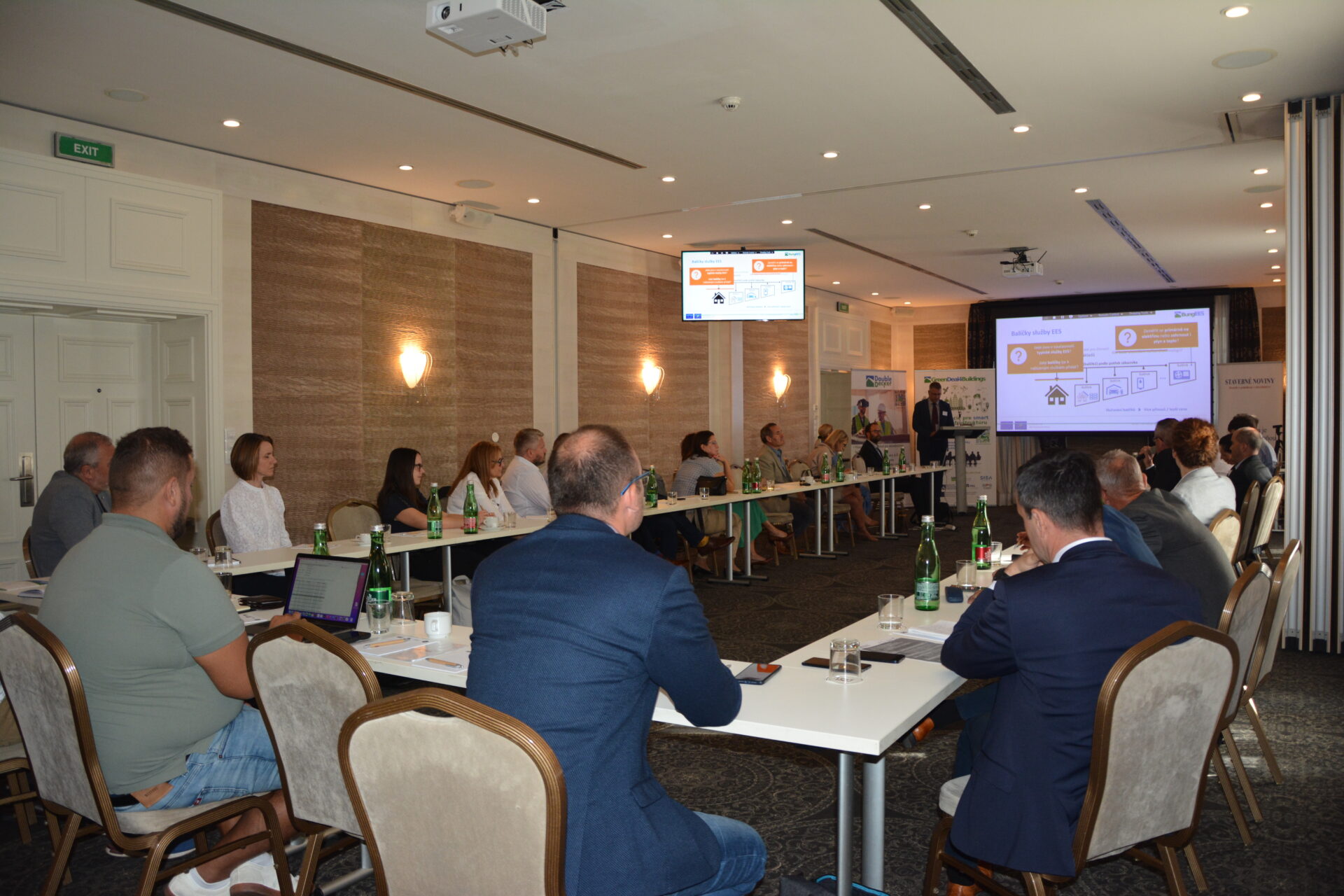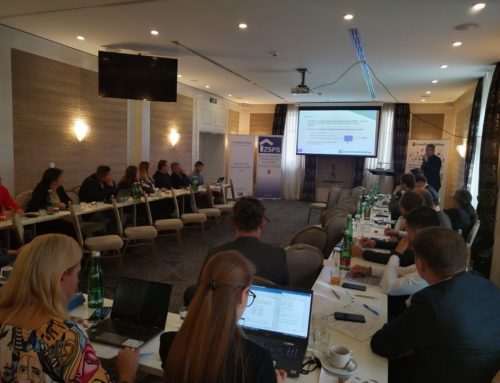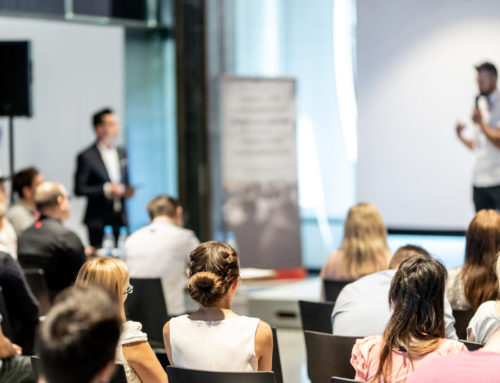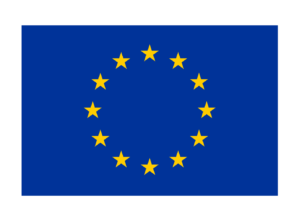On 28 September 2023, the ninth meeting of the Slovak Round Table took place in the conference hall of the LOFT Hotel in Bratislava with 42 participants. The agenda of the meeting was divided into three thematic blocks: the founding meeting of the Platform for Smart Energy Services (PSES), the EIB ELENA technical assistance for the preparation of sustainable energy investment projects and the preparation of sustainable energy investment projects within the framework of the Roundtables.
The meeting was opened by the moderator Stanislav Laktiš from SIEA. He briefly described the purpose of this meeting, explained the objectives of the project and the organizational structure of the round table. The opening word on behalf of the project coordinator, the Association of Construction Entrepreneurs of Slovakia, was given by the President Pavol Kováčik. In the first part on the topic of the Platform for Smart Energy Services (PSES), Mr. Pavol Kováčik, President of ZSPS, Mr. Marcel Lauko, President of APES, Mr. Jiří Karásek from SEVEn and Mr. Stanislav Laktiš from SIEA made a contribution. Mr. Laktiš welcomed the guests and explained the PSES and its functioning. The platform will focus on cooperation (excluding areas regulated by TFEU Articles 101-106) of market participants on both the supply and demand side. The platform is expected to bring together people, assets and data to create entirely new ways of designing, delivering and consuming smart energy services and relevant products. Relevant activities will, for example, include:
- Sharing data, know-how, best practices, innovative solutions, case studies, new business and financial models developed by international projects under EU programmes, e.g. the BungEES project: development of the supply and commercialisation of a new generation of smart energy services capitalising on energy efficiency and demand-side flexibility;
- Training of experts for smart energy services and utilisation of international projects such as the REPowerE(d)U project: a training and qualification system to support the European Commission’s measures to decarbonise flexibility, reduce gas consumption and smooth energy peaks;
- Standardisation of contractual arrangements between different actors;
- Networking to reach the top professionals and operators in the market;
- Market development and use of services that combine energy efficiency with other energy services, technologies and non-energy benefits.
- Energy lab, which will facilitate the design of new complex solutions;
- Market Group, which will test legislative conditions against the needs of market participants;
- An educational platform that will focus on the dissemination of related knowledge and skills.
Mr. Lauko, Director of APES SK – took over the patronage of PSES – explained the activities of APES, stressed that performance-based projects are the way to the future, it is necessary to expand the use of smart energy services, to pay attention to the quality of the indoor environment, it will be necessary to address the involvement of all buildings in energy communities, providing flexibility. APES is currently implementing the Fortesi project – focusing on the implementation of technical solution packages, innovative financing, the aim is to increase EE, influencing user behaviour. He expressed the need to bring sectors together, as in the current environment it is no longer possible to address energy and construction separately.
Mr. Karásek – Presented the topics of energy services and their development, development of SES business models, non-energy benefits of SES within the BUNGEES project, presented its consortium, deliverables and timeline. Two partners are implementation carriers – Voltalis – French aggregator, at the same time one of the largest in the world – 150 thousand households connected, short response time, sells its capacity on energy markets. The second firm – Plenitude and its Spanish subsidiary. Plenitude applies everything that is created in the project to its business, which is unique for similar projects. The research partner is Germany’s Fraunhofer. He presented the flexibility model of the family house that the project has developed. It addresses the involvement of, for example, electromobility and providing flexibility through electric vehicles and at the same time engaging in community energy. Issues to be resolved: energy management costs, installation costs, fees – who will pay them, who will own the installation? Electricity trading? Data sharing, who owns it?
Question to the plenary: should aggregation focus on residential and non-residential sector (schools, nurseries)? The project also addresses flexibility setup, data transfer, flexibility management instructions in residential buildings. The morphology of energy services is questionable. The project therefore addresses the creation of business packages that companies will be able to use. These are e.g. packages for electromobility, energy and electricity storage, heat pumps, etc. They addressed whether it makes sense to focus only on electricity or to also address heat and cooling or gas.
Mr. Karásek presented the Voltalis system. The flexibility system controls heating, water heating and cooling. They have not yet offered to purchase the equipment and operate it. They have tried to incorporate heat pumps, which are more complex in terms of providing flexibility. The aggregator has the ability to shut down the system for heating and hot water for a contracted period of time, while maintaining the comfort of the user, to trade off expensive electricity at a particular time while helping the grid and its stability and trimming peaks.
Plenitude offers a PV installation service and has about 50 installation companies contracted. They also offer provision of hot water supply, energy storage and battery storage and provide management of subsidy mechanisms.
Q: Mr. Piontek (EIB ELENA) – the project also focuses on energy savings, energy communities? What should the one-stop-shop look like?
Answer: Mr. Karásek: our goal is to integrate energy savings with RES and flexibility, it is not a goal to install PV on any house in any condition, this would lead to problems in winter when electricity will be expensive and in summer it will be almost free or in negative prices, so a combination of EE, energy savings. One stop shop – a comprehensive OSS that would provide everything for energetics from A to Z has not yet been seen in the Czech Republic, it is really a complex issue. The project is not focused on creating an OSS, but creating a package of services and business models so that companies are not just selling electricity but a whole package of services. Energy communities – the Czech Republic is running into legislative barriers, gradually every three quarters of a year legislation is being added, but they need to set the rules of the game and municipalities are the ones that are being stretched so far. The biggest gap is the development of energy communities in municipalities. They have future EC projects ready, but they are still waiting. A big boom can be expected when the rules are clear.
Mr. Lauko – it is useful in SR in the heating sector to focus also on residental houses in the framework of flexibility, in combination with CZT. Also non-residential buildings should be involved.
Mr. Doktor – the project has a focus given by the EC, so it is not focused on gas. For now he is focusing on residental houses. Slovakia is more of an observer as far as project reporting is concerned. In our country these things are not so developed. SR will be inspired.
The Powerex company – What is the final product of the project? – Proposals for business models applicable to all EU countries, legal standards, one stop shop in the sense of the company providing a comprehensive package of services on its own or in cooperation with partners. They will be publicly available.
Mr. Doktor – at the same time, trained professionals and experts are also needed for SES provision needs. This is what the RepowerEDU project is being implemented to do.
Mr. Karásek – Non energy benefits (NEB) – NEB are additional or indirect benefits associated with the provision of energy services beyond direct energy savings. An example is a manufacturing hall, a green roof building was created, with indoor environmental management. The biggest benefit was that they didn’t have to find workers, they didn’t have a shortage of staff, recruiting people became very easy. Improved lighting reduces eye strain and better work productivity, better air conditioning reduces CO2 concentration, therefore work productivity, people think better. NEBs are becoming part of EPC projects as well.
What is the experience in Slovakia? Mr. Lauko – every renovation aimed at increasing EE automatically brings NEB. Important whether they were also part of the contract, whether they were required. This does not happen in Slovakia. The design and build method can bring about the design of NEBs in the project. There is no guarantee required for NEBs. There is no experience, there are no clear methodologies on how to measure the achievement of NEB. Several things we cannot measure, e.g., user comfort, how do people feel in the building, reduction in employee sickness, increased work efficiency? It is expected that with the implementation of austerity measures NEB will come.
Amicus company – expressed willingness to be part of the NEB research using their zonal control technology.
Mr. Nemec (Union of Towns) – Can any of this be taken into the preparation of EPC projects or would it make sense to press the Ministry to drop the condition that the return should be evaluated solely on energy savings without operational savings. Mr. Lauko – NEB also includes savings on personnel and operations, but these can be quantified but cannot be applied in EPC projects. Of course, there are business models where they can be included in some way.
Mr. Doktor – the NEB can include e.g. the provision of social services (electric car transport to the doctor, etc.) by a company that provides energy services and operates an electromobility system in the city.
EIB presentation – Zuzana Kaparová – Head of EIB Representation in Slovakia and Andreas Piontek – EIB ELENA Programme Specialist.
Mr. Kováčik – introduced the EIB block. Slovakia is significantly underinvested and investments are not used, both in public and private investments. Slovakia’s problem is that we have a problem to use up the EU funds for construction investments. Grant resources and national resources cannot be enough and private and repayable resources need to be involved. We can take inspiration from abroad and apply good examples of practice. The EIB can help to improve investment.
Ms. Kaparová – The EIB consists of the European Investment Fund and the EIB. The shareholders are the Member States, it is an EU bank. It is the EU’s climate bank, it is committed to compliance with the Paris Agreement. The EIB also operates outside Europe. Largest provider of funds internationally. In its history, it has lent over EUR 4.9 trillion. They lend to the public sector but also to the private sector (corporates, framework loans to banks who then lend to businesses). EIB provides low interest rates and long maturities. The most common products are direct loans, framework loans. ELENA programme – an initiative of the EC and the EIB. It finances project preparation and investment.
The second part of the meeting was dedicated to the EIB ELENA Technical Assistance for the Preparation of Sustainable Energy Investment Projects, with a keynote presentation by EIB representative Andreas Piontek.
Andreas Piontek – EIB ELENA:
- Elena is free money for various entities. It has been running since 2009 and has supported more than 157 projects. They fund renovations of buildings and urban infrastructure. Often times there is no funding available for project preparation and that is what ELENA is for. The only obligation that the applicant has to do is that they have to implement the investment. The beneficiary has to meet the leverage factor, for every 1 euro provided, it has to invest 10 or 20 times. They support the public and private sector in the residential and non-residential sector and sustainable urban transport. Virtually anyone can apply for ELENA, but not individual natural persons (only government, municipalities, corporations, banks and other financial institutions public and private). In the case of a private entity, the investment must be made within 3 years. A public institution must start the public procurement process within those 3 years. In case of objective reasons, the project can be extended by one year.
- The minimum investment amount is 30 million, therefore aggregation of several projects is necessary, in the case of the public sector, the applicant can be e.g. a local authority, which puts together projects for several towns and municipalities. A national project is also an option. ELENA covers 90% of the project costs. Subsequent investments can be made from any source. Public institutions mainly use euro funds.
- Examples in Slovakia are the project of the Košice Region, the Prešov Region and currently the Trenčín Region is preparing an application. Important for these projects is the procurement of external consultants, experts in energy, building renovation and project preparation.
- Further details are available in Mr. Piontek’s presentation or on the EIB website, or from presentations at the EIB roadshow in Bratislava https://www.euconf.eu/events/elena-roadshow-slovakia. If the applicant wants to know more, he/she can contact the EIB directly and the experts will help with the preparation of the project application.
Questions and answers:
- Is it also possible to finance the construction of new buildings? No, only renovation.
- It is not possible to fund projects retroactively.
- SIH is not involved in ELENA.
- Stand-alone RES are not supported, only integrated into the building.
- ELENA does not provide experts for the preparation of project documentation, beneficiaries have the possibility to contract experts.
- Mr. Vaňo (VÚB) – how did they arrive at the limit of 30 million? Answer: because they want to support aggregation of smaller projects, because municipalities cannot afford to deal with smaller projects alone. The EC has other financial mechanisms for smaller projects.
- Can other non-EU countries be part of the project? No, because they cannot guarantee to meet the investment.
- Thus, when leverage is not met, only the portion of the grant that achieves the investment is eligible. If the beneficiary knows that it will not achieve leverage, it can only use as much of the funds that are eligible.
- The grant is provided as follows: 40% down payment and 30% after 18 months and the remaining 30% after completion of the project.
The third part was devoted to the preparation of sustainable energy investment projects in the framework of round tables – the topic was introduced by Pavol Kováčik, President of ZSPS.
Mr. Kováčik – it is necessary to understand what money should be used for restoration projects. A lot of projects use euro funds. It is necessary to turn the funding into sustainable, subsidies cannot guarantee this. There are several funding opportunities also in our country and it is necessary to have a stack of projects to guarantee the readiness of entities and projects. The stack is also to ensure networking of entities that can implement projects together.
The project repository will be a structured database of project ideas and plans.
Projects do not have to be aimed at a direct economic effect. We also want to include educational projects.
Mr. Doktor: A similar stack was created in Italy for EUR 700 million, where projects were also implemented. Other projects have also been kick-started. It has also been set up in Spain. The template requires a minimum of information, then discussions will take place with the submitters to refine it. Once the funds are available and blending issues are resolved and forms such as crowdfunding and community projects are resolved and so such projects from the stack can get funding.
Mr. Kováčik – the funding has been transformed into waiting for calls from the EU funds and we have caused a decline in investment. Slovakia has the second/third largest share of investments from EU funds. 80% of public investments are from EU funds. This has also had an impact on the decline in the construction sector.
Bartoš – He proposes to create a fund for the renovation of public buildings, which would basically copy and adapt the ŠFRB system. The SFRB has a well established project evaluation system, the system can be copied and it is very easy to create such a fund. For example, the subsidy from the Ministry of Regional Development could be taken as a share in a loan from the fund, so that more projects could be supported and, because it is a loan, the funds would be returned and could be used further. He suggests transforming the subsidies into loan products and spinning the money.
The SFRB registers a huge demand for financing the renovation, currently it is about 800 flats. Mr. Doktor – it is possible to use the European loan to increase the financing, which is only a proposal at the EU level for the time being.
Mr. Wallner – municipalities will not go into loans because they are in debt, they would rather go into free money from the funds. Need to simplify the challenges as much as possible. Give technical assistance to applicants. Inspiration can be taken from the Czech Republic (Státní fond životního prostředí, the Green Savings Programme) but also in Poland (the Ciste povietre programme).






